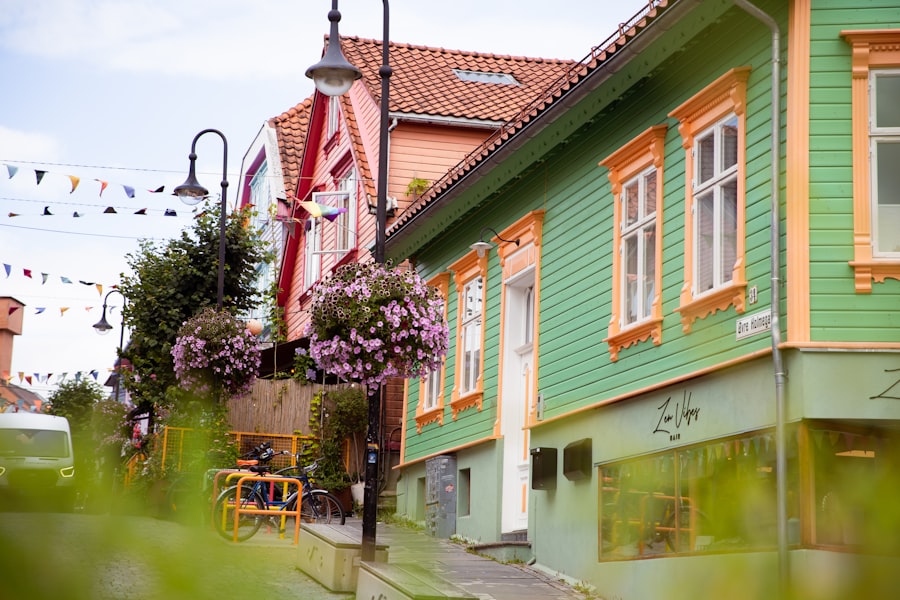The term ‘Dugnad’ is deeply rooted in Norwegian culture, embodying the spirit of communal effort and cooperation. It refers to a voluntary work initiative where members of a community come together to accomplish tasks that benefit the collective. This practice is not merely about completing chores; it is a celebration of solidarity, where individuals contribute their time and skills for the greater good.
The essence of ‘Dugnad’ lies in its ability to foster relationships among participants, creating a sense of belonging and shared responsibility. In Norway, ‘Dugnad’ is often associated with various contexts, from neighbourhood clean-ups to larger community projects. However, its significance is particularly pronounced within housing cooperatives, where residents collaborate to maintain and improve their living environment.
This tradition reflects the Norwegian ethos of egalitarianism and mutual support, reinforcing the idea that everyone has a role to play in nurturing their community. As such, understanding ‘Dugnad’ is essential for anyone looking to integrate into Norwegian society, especially for newcomers who may be unfamiliar with this cultural practice. Plan your relocation with confidence. Book a personal meeting with the Norway Relocation Group today. https://norwayrelocation.no/one-hour-strategy-session/
Summary
- ‘Dugnad’ is a Norwegian concept of community volunteering and cooperation, often applied in housing cooperatives.
- The legal framework for ‘Dugnad’ in housing cooperatives is outlined in the cooperative’s bylaws and may include specific obligations for residents.
- Participating in ‘Dugnad’ can lead to a cleaner, safer, and more pleasant living environment, as well as a stronger sense of community and belonging.
- Typical tasks in ‘Dugnad’ include cleaning common areas, gardening, maintenance work, and organising social events.
- ‘Dugnad’ fosters a sense of community in housing cooperatives by encouraging residents to work together towards common goals and creating opportunities for social interaction.
The legal framework for ‘Dugnad’ in housing cooperatives
In Norway, the legal framework surrounding ‘Dugnad’ in housing cooperatives is primarily governed by the Housing Cooperative Act. This legislation outlines the rights and responsibilities of cooperative members, including their obligations to participate in communal activities like ‘Dugnad’. While participation is generally voluntary, many housing cooperatives have established guidelines that encourage or even require members to engage in these activities as part of their commitment to the community.
The legal framework also provides a structure for how ‘Dugnad’ should be organised within housing cooperatives. It typically includes provisions for decision-making processes, task allocation, and conflict resolution. By adhering to these guidelines, housing cooperatives can ensure that ‘Dugnad’ is conducted fairly and efficiently, allowing all members to contribute meaningfully.
This legal backing not only legitimises the practice but also reinforces its importance as a cornerstone of cooperative living in Norway.
The benefits of participating in ‘Dugnad’

Participating in ‘Dugnad’ offers numerous benefits that extend beyond the immediate tasks at hand. One of the most significant advantages is the opportunity to build relationships with neighbours. Engaging in communal work fosters camaraderie and trust among residents, creating a supportive network that can be invaluable in times of need.
This social aspect of ‘Dugnad’ can lead to lasting friendships and a stronger sense of community, making it easier for individuals to feel at home in their environment. Moreover, ‘Dugnad’ can lead to tangible improvements in the living conditions of housing cooperatives. Whether it’s maintaining gardens, cleaning common areas, or undertaking minor repairs, the collective effort often results in a more pleasant and well-kept environment.
This not only enhances the aesthetic appeal of the cooperative but can also increase property values over time. Additionally, participating in ‘Dugnad’ can instil a sense of pride among residents, as they take ownership of their shared spaces and contribute to their upkeep.
The types of tasks typically included in ‘Dugnad’
The tasks involved in ‘Dugnad’ can vary widely depending on the needs of the housing cooperative and the season. Common activities include gardening, cleaning communal areas, painting walls, and performing minor repairs. In spring and summer, residents might focus on outdoor tasks such as landscaping or planting flowers, while autumn may see efforts directed towards preparing the property for winter.
These activities not only serve practical purposes but also allow residents to showcase their skills and creativity. In addition to physical tasks, ‘Dugnad’ can also encompass organisational activities such as planning events or coordinating community meetings. These efforts are crucial for maintaining an active and engaged community.
By participating in both hands-on tasks and organisational roles, residents can contribute to a well-rounded cooperative experience that addresses both immediate needs and long-term goals.
How ‘Dugnad’ fosters a sense of community in housing cooperatives
At its core, ‘Dugnad’ is about more than just completing tasks; it is a powerful tool for fostering community spirit within housing cooperatives. When residents come together to work towards a common goal, they create bonds that transcend mere neighbourly interactions. This shared experience cultivates a sense of belonging and mutual respect, which is essential for a harmonious living environment.
Furthermore, ‘Dugnad’ encourages open communication among residents. As individuals collaborate on various projects, they have opportunities to share ideas, discuss concerns, and celebrate achievements together. This dialogue not only strengthens relationships but also promotes a culture of inclusivity where everyone feels valued and heard.
In this way, ‘Dugnad’ serves as a catalyst for building a vibrant community where residents are invested in each other’s well-being.
The consequences of not participating in ‘Dugnad’

While participation in ‘Dugnad’ is often encouraged, there can be consequences for those who choose not to engage. In many housing cooperatives, non-participation may lead to feelings of isolation or disconnection from the community. Residents who do not take part may miss out on valuable social interactions and opportunities to form friendships with their neighbours.
This can create an atmosphere where some individuals feel excluded or less invested in the cooperative’s well-being. Additionally, non-participation can place an undue burden on those who do engage in ‘Dugnad’. When only a few residents consistently contribute their time and effort, it can lead to resentment and frustration among active members.
This imbalance may ultimately undermine the cooperative’s spirit and effectiveness, making it essential for all residents to recognise their role in maintaining a healthy community dynamic.
How to organise and schedule ‘Dugnad’ in your housing cooperative
Organising and scheduling ‘Dugnad’ effectively requires careful planning and communication among residents. A successful approach often begins with forming a committee or designating a coordinator responsible for overseeing the initiative. This individual or group can assess the needs of the cooperative, gather input from residents about preferred tasks, and establish a schedule that accommodates everyone’s availability.
Utilising digital tools can greatly enhance the organisation process. Many housing cooperatives now use online platforms or social media groups to communicate about upcoming ‘Dugnad’ events. These tools allow residents to sign up for specific tasks, share ideas for future projects, and provide feedback on past initiatives.
By fostering an open dialogue about scheduling and task allocation, housing cooperatives can ensure that ‘Dugnad’ remains an inclusive and engaging experience for all members.
Tips for successful participation in ‘Dugnad’
To make the most of your participation in ‘Dugnad’, consider adopting a proactive mindset. Approach each event with enthusiasm and an open heart; this attitude can be contagious and inspire others to engage fully as well. Arriving with a willingness to learn new skills or take on unfamiliar tasks can also enhance your experience while contributing positively to the cooperative’s efforts.
Additionally, fostering teamwork during ‘Dugnad’ is crucial for success. Encourage collaboration by pairing up with neighbours or forming small groups to tackle specific tasks together. This not only makes work more enjoyable but also strengthens relationships among participants.
Remember that communication is key; sharing ideas and offering assistance can lead to more efficient outcomes while reinforcing the sense of community that ‘Dugnad’ embodies.
Addressing common challenges and conflicts in ‘Dugnad’
Despite its many benefits, ‘Dugnad’ can sometimes give rise to challenges or conflicts within housing cooperatives. One common issue is differing levels of commitment among residents; some may be eager participants while others may feel overwhelmed or reluctant to engage. Addressing these disparities requires open communication and understanding from all parties involved.
To mitigate potential conflicts, it is essential to establish clear expectations regarding participation from the outset. Housing cooperatives should create guidelines that outline what is expected from each member during ‘Dugnad’, including attendance requirements and task allocations. By setting these standards collaboratively, residents can foster a sense of accountability while ensuring that everyone feels comfortable contributing at their own pace.
The role of the housing cooperative board in overseeing ‘Dugnad’
The housing cooperative board plays a vital role in overseeing ‘Dugnad’ initiatives within the community. Their responsibilities include ensuring that activities align with the cooperative’s goals and values while providing support for organising events effectively. The board should also facilitate communication between residents and address any concerns or conflicts that may arise during ‘Dugnad’.
Moreover, the board can help promote participation by recognising and celebrating the contributions of active members. Acknowledging individual efforts fosters motivation among residents while reinforcing the importance of collective action within the cooperative. By taking an active interest in ‘Dugnad’, the board can help cultivate a culture of engagement that benefits everyone involved.
The future of ‘Dugnad’ in housing cooperatives
As society continues to evolve, so too does the concept of ‘Dugnad’. While its roots are firmly planted in Norwegian tradition, modern challenges such as urbanisation and changing demographics may influence how this practice is carried out within housing cooperatives. Nevertheless, the fundamental principles of cooperation and community spirit remain relevant today.
Looking ahead, it is essential for housing cooperatives to adapt ‘Dugnad’ practices to meet the needs of diverse populations while preserving its core values. Embracing technology for organisation and communication will likely play a significant role in shaping future initiatives. Additionally, incorporating new ideas and perspectives from residents will ensure that ‘Dugnad’ remains an inclusive and meaningful experience for all members.
In conclusion, understanding and participating in ‘Dugnad’ is crucial for anyone living in a Norwegian housing cooperative. The Norway Relocation Group can assist newcomers by providing insights into this cultural practice and helping them navigate their new environment effectively. Furthermore, those interested in enhancing their language skills will find valuable resources at the NLS Norwegian Language School in Oslo, where they can enrol in courses designed to facilitate integration into Norwegian society while embracing traditions like ‘Dugnad’.
Register for a Norwegian class at the NLS Norwegian Language School now!

